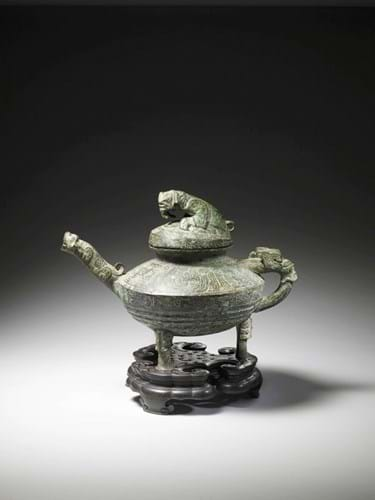Telephone bidders vied with buyers in the room at the Canterbury Auction Galleries this morning (Wednesday, April 11), with bids starting at the low estimate of £120,000, quickly exceeding the top estimate of £200,000.
Bidding slowed at £320,000, but auctioneer Cliona Kilroy managed to drive bids up in £10,000 increments, to eventually put the hammer down at £410,000 to a telephone bidder.
Only six similar archaic vessels, or ying, are known to exist. Discovered in a Kent seaside town, the seventh vessel has previously unrecorded decoration.
'Tiger ying'
Dating from the period 1027-771BC (the pottery core of the handle and one foot have been subjected to a thermo-luminescence test in Oxford), the vessel has been christened ‘the tiger ying’ – a reference to the auspicious felines that adorn the spout and cover.
It had been found by Alastair Gibson, London dealer and the Canterbury saleroom’s Asian art consultant, together with three Qing bronzes and an archive of letters and photographs relating the military history of the Evans family of Monmouthshire.
Surviving letters from its erstwhile owner, Royal Marines Captain Harry Lewis Evans (1831-83), give a vivid account of the Second Opium War. He took part in the capture of Canton in 1857, and the failed attack on the Taku Forts in 1859. In a letter dated October 17, 1860, he recorded in detail the infamous looting of the Yuanming Yuan, or Old Summer Palace.
“The General sent out for all the carts he could find, brought in as much as they could carry, and all the things were sold by auction for prize money for the force. I expect to get about five and forty pounds for my share.
“I succeeded in getting several bronzes and enamel vases as well as some very fine porcelain cups and saucers of the Emperor’s imperial pattern, but they are so dreadfully brittle that I quite despair ever being able to get them home in their present condition.”
China government protest
China’s cultural heritage department had protested at the sale, asking for the object to be returned – a standard response by the country when items looted from the Summer Palace come up for sale. It said the bronze ying was an “illegally discharged cultural relic” but Canterbury went ahead with the auction.







